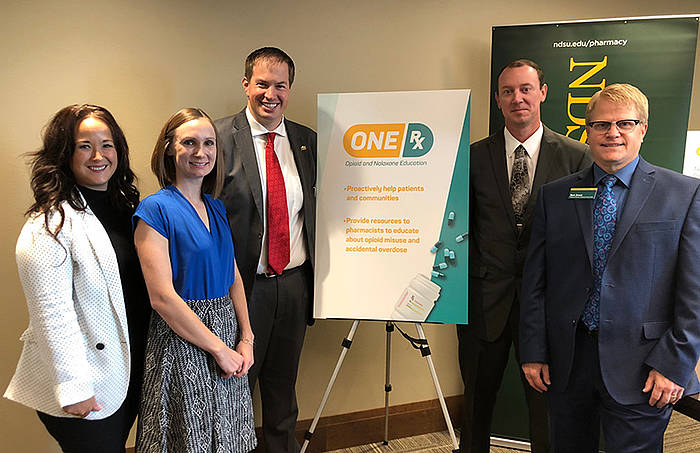
A new statewide program, called ONE Rx, aims to stem opioid misuse by increasing awareness when patients first fill an opioid prescription. The program was announced Aug. 15 in Bismarck, North Dakota.
ONE Rx, which stands for opioid and naloxone education, is an innovative approach to educate patients who receive prescribed opioid medications in participating community pharmacies in the state of North Dakota. Addressing opioid use prior to misuse is a cornerstone to help communities.
The project is the effort of multiple partners to proactively help patients and communities. The program received grants totaling $150,648 to make it available in fall 2018. Funding from the North Dakota Department of Human Services, the Alex Stern Family Foundation and the Blue Cross Blue Shield of North Dakota Caring Foundation made the program possible.
“We commend the partners in this program for recognizing the key role community pharmacists can play in preventing opioid misuse, and for ensuring those who fill opioid prescriptions have the education and training they need to properly screen patients and identify those who may be at higher risk,” said Gov. Doug Burgum. “The state is pleased to participate in this program through the North Dakota Department of Human Services as another way of addressing the opioid crisis on the front end and preventing the misuse and overdoses that are devastating families and communities across North Dakota and the nation.”
The pharmacy profession in North Dakota has a reputation for being progressive and a national leader, according to Mark Hardy, executive director of the North Dakota Board of Pharmacy.
“We know that some people do need prescribed opioids in some circumstances and many are not always aware of the impact the prescribed drugs can have,” said Hardy. “ONE Rx is designed to equip pharmacists with tools to screen for opioid use disorder, identify patient needs and provide counseling and resources to safely use prescribed opioids.”
The group enlisted the expertise of faculty in the NDSU School of Pharmacyto provide statewide continuing education for community pharmacists. The free three-hour training sessions are scheduled to be offered in Fargo on Oct. 3, in Bismarck on Oct. 12, and in Minot on Oct. 13. Participating community pharmacies also will be provided a toolkit with the resources they need to deliver this program of care. The program covers the science of addiction, opioid use and community support services. Pharmacists will be able to register for the training by going to the North Dakota Board of Pharmacy website and clicking on ONE Rx events.
“Community pharmacists have a unique relationship with their patients and are often the most easily accessible health professionals in their communities,” said Mike Schwab, executive vice president of the North Dakota Pharmacists Association. “This program will provide tools to assist community pharmacists to do even more to ensure safe use of opioids.”
The continuing education program developed in the NDSU School of Pharmacy will educate pharmacists in North Dakota on a method to screen patients receiving opioids, using the Opioid Risk Tool, called ORT. The tool assists in identifying individuals who may be at higher risk of opioid misuse. Pharmacists who are trained to administer the tool can then provide patient care and counseling as needed.
The program also will deliver education on the use of naloxone to reverse the effects of an opioid overdose. NDSU School of Pharmacy faculty members Mark Strand, Heidi Eukel, Amy Werremeyer and Elizabeth Skoy along with Jayme Steig of Quality Health Associates of North Dakota, received the grants and will be among those providing the continuing education.
The FM Area Foundation and North Dakota Board of Pharmacy also provided initial seed funding for an earlier pilot project.
In the pilot program, 26 percent of patients identified at some risk of opioid misuse. Approximately 30 percent of patients in the pilot study identified at risk of accidental overdose.
“This continuing education program for pharmacists at community pharmacies in North Dakota moves opioid misuse and overdose prevention to the initial patient encounter,” said Skoy, associate professor in the NDSU School of Pharmacy. “We are grateful to these organizations and agencies that have provided funding to make this continuing education available for community pharmacists in the state.”
As a student-focused, land grant, research institution, we serve our citizens.